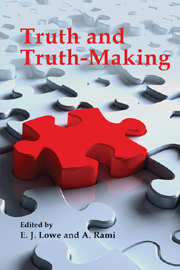Book contents
- Frontmatter
- Contents
- Preface
- Contributors
- 1 Introduction: truth and truth-making
- Part I Setting the stage
- 2 Truth and the truth-maker principle in 1921
- 3 Truth-makers
- 4 Truth-makers, entailment and necessity
- 5 Postscript to “Truth-makers, entailment and necessity”
- 6 Truth-making and difference-making
- 7 The general theory of truth-making
- Part II The current debate
- Bibliography
- Index
4 - Truth-makers, entailment and necessity
from Part I - Setting the stage
- Frontmatter
- Contents
- Preface
- Contributors
- 1 Introduction: truth and truth-making
- Part I Setting the stage
- 2 Truth and the truth-maker principle in 1921
- 3 Truth-makers
- 4 Truth-makers, entailment and necessity
- 5 Postscript to “Truth-makers, entailment and necessity”
- 6 Truth-making and difference-making
- 7 The general theory of truth-making
- Part II The current debate
- Bibliography
- Index
Summary
Australian Realists are fond of talking about truth-makers. Here are three examples from the recent literature
… suppose a is F … What is needed is something in the world which ensures that a is F, some truth-maker or ontological ground for a's being F. What can this be except the state of affairs of a's being F?
(Armstrong 1989a: 190)If b entails Π, what makes Φ true also makes Π true (at least when Φ and Π are contingent).
(Jackson 1994: 32)The hallowed path from language to universals has been by way of the correspondence theory of truth: the doctrine that whenever something is true, there must be something in the world which makes it true. I will call this the Truthmaker axiom. The desire to find an adequate truthmaker for every truth has been one of the sustaining forces behind traditional theories of universals … Correspondence theories of truth breed legions of recalcitrant philosophical problems. For this reason I have sometimes tried to stop believing in the Truthmaker axiom. Yet, I have never really succeeded. Without some such axiom, I find I have no adequate anchor to hold me from drifting onto the shoals of some sort of pragmatism or idealism. And this is altogether uncongenial to me; I am a congenital realist about almost everything, as long as it is compatible with some sort of naturalism or physicalism, loosely construed.
(Bigelow 1988a: 122–3)Information
- Type
- Chapter
- Information
- Truth and Truth-Making , pp. 87 - 97Publisher: Acumen PublishingPrint publication year: 2008
